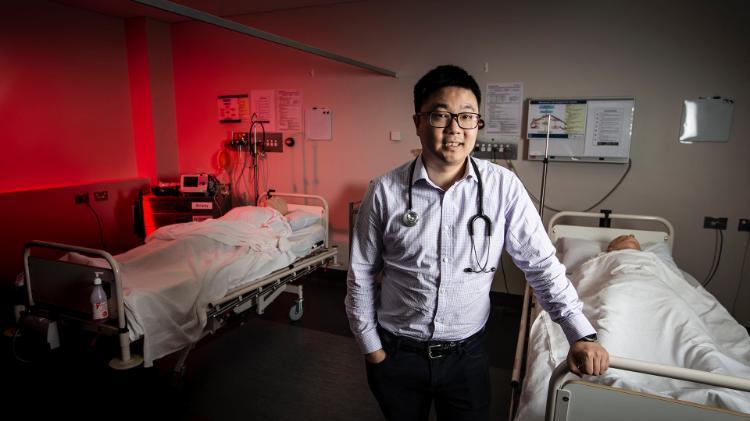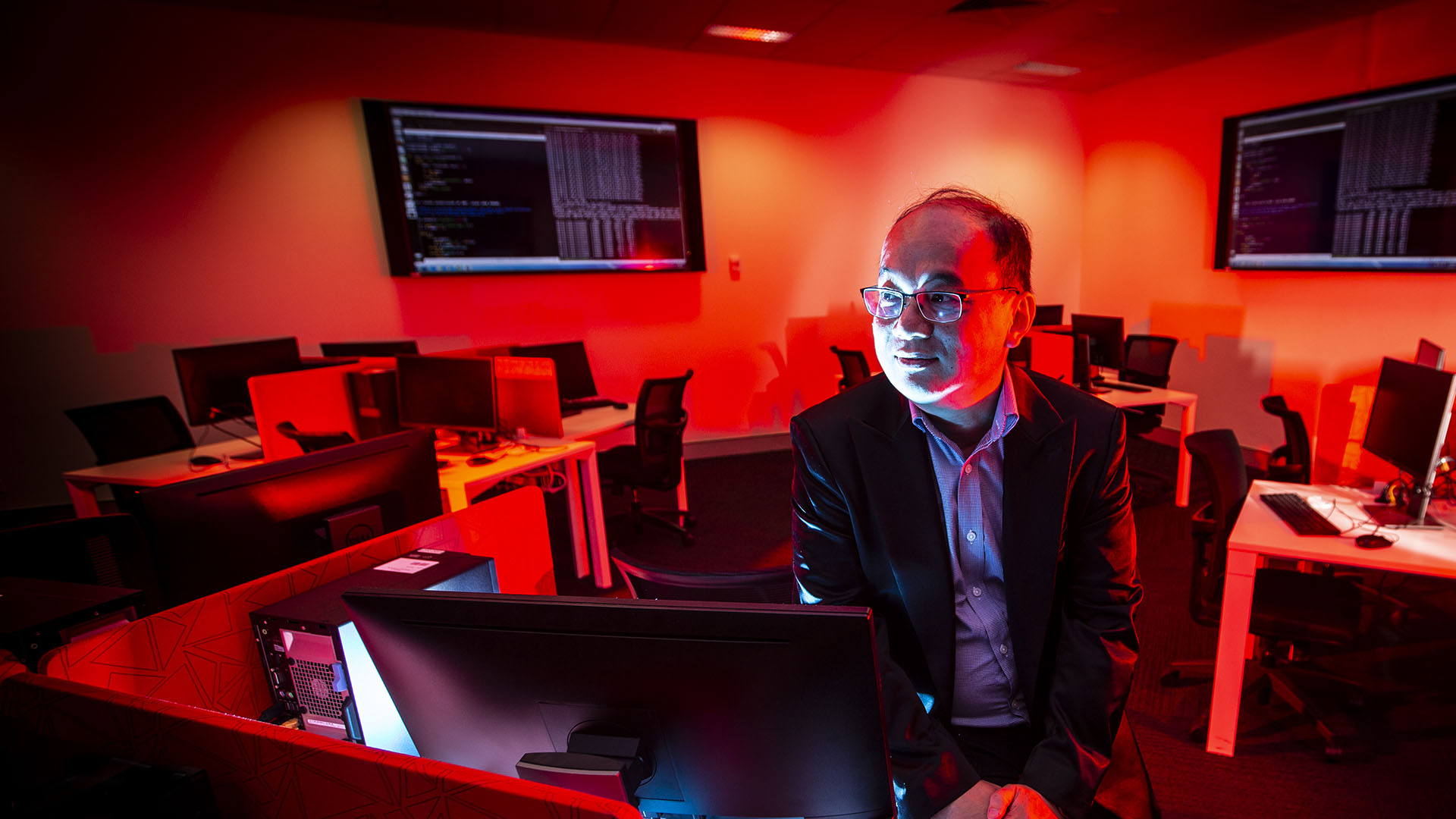August 20, 2019
NUW Impact 2019 Seed Funding recipients announced
Combatting cyber attacks in real time and improving cancer outcomes for rural patients among successful projects
Three University of Wollongong-led projects are among the recipients of the 2019 NUW Impact funding round.
The NUW Alliance, comprising the University of Newcastle, UNSW Sydney and the University of Wollongong, announced the seed funding recipients following a highly competitive response to the inaugural call for projects.
In total five collaborative research teams are the successful recipients of a total of almost $540,000 in research funding.
The NUW Impact 2019 Seed Funding recipients are:
- Visualising intrusion detection and behavioural analytics data in real-time for combatting cyber attacks and creating awareness. Project team is led by Willy Susilo, University of Wollongong.
- Not getting a fair go: why do people in rural areas with cancer have worse outcomes? Project team is led by Joel Rhee, University of Wollongong.
- The influence of diet on the microbiome and the subsequent manifestation of metabolic disease including non-alcoholic fatty liver disease. Project team is led by Eleanor Beck, University of Wollongong.
- Antimicrobial Research Taskforce. Project team is led by Peter Lewis, University of Newcastle.
- The Effects of Newborn Hearing Screening and Early Intervention on Academic Outcomes in Children with Hearing Loss. Project team is led by Massimiliano (Max) Tani, UNSW Sydney.
Further details on the projects are available below.

Associate Professor Joel Rhee, a practising GP and researcher with the University of Wollongong’s School of Medicine, will lead the project to improve cancer outcomes for rural patients. Picture: Paul Jones, UOW
NUW Impact projects must deliver significant positive social, economic, environmental or cultural impact that is targeted, sustainable and measurable, and deliver a contribution beyond academic debate.
NUW Alliance CEO Matt Gijselman said every project funded is a collaboration with representation from across the Alliance’s three partner universities.
“The NUW Alliance is trailblazing a path for education and research, to genuinely and tangibly impact and improve the future of New South Wales and beyond,” Mr Gijselman said.
“This announcement is a concrete example of the sort of collaboration that can start to solve some of the greatest challenges facing our state.”
With a core commitment to exploring and solving challenges impacting New South Wales, the NUW Alliance has established a program to provide seed funding to support collaborative research projects that deliver genuine solutions for critical issues facing our community.
Through an annual competitive program, and in consultation with its three partner university vice-chancellors, the NUW Alliance considers applications for funding to support research projects that involve collaboration across all three universities, align with the vision and goals of the Alliance and with existing government, industry and community priorities, and promise to deliver a high quality, feasible result.
NUW IMPACT 2019 SEED FUNDING PROJECT DETAILS
Visualising intrusion detection and behavioural analytics data in real-time for combatting cyber-attacks and creating awareness. Project team is led by Willy Susilo, University of Wollongong
Cyber security is a global issue that knows no borders. Cyberspace consists of a massive number of complex interacting elements. In this domain, cyber operations occur in real-time, on large-scale and dynamic network environments.
In addition, behavioural analytics plays an important role in detecting patterns of network transmissions that are out of the norm. The fundamental problem in the current cyber landscape is that most traditional techniques for combatting cyber attacks rely heavily on highly manual processes involving computer security experts scrutinising huge amounts of data to recognise threat patterns, and to identify attacks and weaknesses. This fails to address the ultimate problem that cyber attacks occur in real-time.
The aim of this project is to develop techniques to visually represent intrusion detection and behavioural analytics data to a human user in real-time.
Modern cyberwarfare is a rapidly changing landscape. New attacks and behaviours frequently emerge with patterns that are vastly different from the pool of known attacks. This requires rapid assessment and actions to adapt intrusion detection technology to handle any new attack patterns.
As such, the goal of this project is to develop techniques for intrusion detection systems using real-time visualisation to combat cyber-attacks. This essentially empowers a "human-in-the-loop" approach by presenting real-time visual cyber information to human user(s), creating situation awareness. The human user(s) can then immediately assess and make decisions to adapt intrusion detection systems to detecting and handling new incoming threats.
The outcome of this project will provide a significant leap towards achieving an effective solution against real-time cyber-attacks like Distributed Denialof-Service (DDoS) attacks.

Senior Professor Willy Susilo, Director of UOW's Institute of Cybersecurity and Cryptology, will lead the project to develop ways of combatting cyber attacks in real time. Picture: Paul Jones, UOW
Not getting a fair go: why do people in rural areas with cancer have worse outcomes? Project team is led by Joel Rhee, University of Wollongong
Cancer places a huge burden on the health of people living in NSW, especially those living in rural areas. A recent NSW study showed that rural residents have worse survival for breast, colon, lung, ovarian, and rectal cancers compared to their urban counterparts.
Other Australian and international studies paint a similarly bleak picture regarding survival and cancer stage at diagnosis and treatment as a result of poorer access to health services, socioeconomic factors as well as ‘rural stoicism’. However, a recent WA trial of an intervention designed to raise symptom awareness and GP education in rural communities did not show significant improvements.
Therefore a new approach is required to address this problem. The design of an effective new intervention requires an understanding of the exact time points in which delays occur in the initial diagnosis and treatment of cancer. Yet there is a paucity of studies examining delays in diagnosis and treatment (and their determinants) in rural NSW.
This project will combine and analyse data from multiple existing administrative sources including Medicare, PBS, hospitals, and general practices, to:
- compare diagnostic and treatment intervals between rural and urban people with cancer in NSW;
- examine the relationship between time intervals and mortality and stage at diagnosis; and
- explore factors that may contribute to rural and urban time to treatment start/delays.
This is a bold and ambitious study, the first of its kind in NSW. The findings will allow us to work closely with health service providers to design and test interventions to reduce the disparity in cancer outcomes for rural and urban people living in NSW.
The influence of diet on the microbiome and the subsequent manifestation of metabolic disease including non-alcoholic fatty liver disease. Project team is led by Eleanor Beck, University of Wollongong.
The costs associated with medical therapy are significant such that there are major economic benefits that can be derived through better understanding of dietary manipulation treatment in non-alcoholic fatty liver disease (NAFLD).
The proposed research will establish a consortium of researchers at UOW, UNSW and UON that includes clinicians (medical and dietetics) and scientists who will study how diet influences the microbiome in health and fatty liver disease (‘dysbiosis’) and determine the impact on disease manifestation, severity and clinical sequalae.
The central premise of this research is that dysbiosis in NAFLD can be altered through changes in dietary composition. To investigate, the study will recruit, characterise and subsequently undertake trials of therapy in this patient cohort. By overcoming a ‘siloed approach’ based around a single discipline (hepatology, dietetics or microbiology) the cross-discipline data generated will more fully inform any improvement in patient outcomes.
The highest rates of obesity and NAFLD in Australia are found in the regions served by the NUW Alliance and the investigators on this proposal. The major outcomes from this research will
- establish and characterise a patient cohort (clinical, dietary and microbiome);
- understand the influence if diet on the microbiome; and
- direct future clinical trials of dietary interventions to both reduce energy intake and reverse dysbiosis in this patient cohort.
This is a unique opportunity that will ultimately lead to collaborative MRFF and NHMRC applications from this investigator group. Importantly, the group of investigators names in this NUW Alliance application are associated with the provision of healthcare to a population catchment in excess of two million people and this study will directly impact patient outcomes in the highest prevalence areas of obesity and NAFLD in Australia.
Antimicrobial Research Taskforce. Project team is led by Peter Lewis, University of Newcastle
Antibiotic resistant infections are rising at an alarming rate and by 2050 are predicted to become the major cause of mortality, outstripping diseases such as cancer.
Many public health and epidemiological approaches are being investigated to determine how rising resistance rates can be slowed or even stopped, but a cornerstone to continued control and treatment of these infections is the development of effective new antibiotics. This is no longer an activity being undertaken by the major pharmaceutical companies and so there is a need for a major commitment from the academic sector to drive this essential sector of medicine.
The aim of this project is to establish a collaborative group of NUW academics with a collective goal of developing new anti-microbial compounds effective against antibiotic resistant infections. This will be initiated through holding a 2-day workshop with a strong focus on problem solving and networking to establish new collaborative teams.
The outcome of the workshop will be the formation of new teams of academics who will utilise their combined expertise to address key aspects of target validation, drug discovery, development and testing. The long-term outcomes will be the identification of a range of new drug leads which will be suitable for taking onto clinical trials following appropriate protection of IP.
The potential impact is the discovery and development of new antibiotics that will be suitable for use even against organisms that have resistance to all current clinically available antibiotics.
The Effects of Newborn Hearing Screening and Early Intervention on Academic Outcomes in Children with Hearing Loss. Project team is led by Massimiliano (Max) Tani, UNSW Sydney
The Longitudinal Outcomes of Children with Hearing Impairment (LOCHI) study has prospectively collected information from a population-based cohort of 451 children with permanent congenital hearing loss from inception, including variabilities in intervention and demographic variables.
The LOCHI study is the world’s first, and most comprehensive, longitudinal study on outcomes of children with hearing loss. This project aims to conduct secondary analyses of selected LOCHI data to address two research questions:
- How do universal newborn hearing screening (UNHS) and early intervention (i.e. fitting hearing aids or cochlear implants) promote academic performance for children with hearing loss?
- How can public policy and disability service be improved to support human capital development of children with hearing loss?
To address the first question, Academic outcomes of the LOCHI children collected when they were 9 years of age will be analysed. The outcomes data included scores on reading, numeracy, spelling, grammar and writing from the Australia’s National Assessment Program – Literacy and Numeracy (NAPLAN) tests in Year 3.
This study will use advanced econometrics to identify the causal effects of UNHS and early interventions on NAPLAN outcomes among children with hearing loss. It will also explore the potential socioeconomic and cognitive/non-cognitive mechanisms through which UNHS and early interventions may take effect.
To address the second question, the study will conduct a two-day workshop at the Australian Hearing Hub to discuss the empirical findings from the LOCHI data with people with hearing loss, parents, teachers, health services providers, policy-makers and researchers.
The workshop outcomes will be used to draw policy implications, and to develop and prioritise future research directions and external grant applications to the U.S. National Institutes of Health (NIH), the ARC and the NHMRC.
